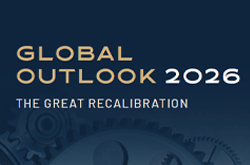The ESG filter applied to currency risks
Article by Hugo de Vasconcelos, Senior Forex Advisor at Indosuez in Switzerland, for Le Temps magazine.
Environmental, social and governance (ESG) criteria are becoming increasingly important in investment decisions. However, this is not necessarily the case for the foreign exchange market. Indeed, who thinks about social diversity or waste management when considering what currencies they are invested in?
Investors have become accustomed to selecting bonds or shares based on ESG screening of the issuing companies. Although currencies are not securities, applying the same logic (screening the issuer) leads us to examining the ESG score of currency-issuing sovereigns. Fortunately, ESG analysis of sovereign issuers is readily available, so investors can evaluate currencies using this filter.
As a first step, we have assessed the extent to which ESG screening applied to currencies could offer the same benefits as with bonds and equities, both in terms of non-financial impacts (beyond investor satisfaction of investing in a sustainable currency), as well as in terms of risks and opportunities that would have been missed by conventional financial analysis.
Non-financial impacts
As ESG screening is not yet widespread in the foreign exchange market, we must attempt to infer what the impact of its adoption would be on the decisions of policy makers.
Considering the economic incentives - investors deciding on their currency allocation observe two influencing factors: the spot price of the currency and its financing cost. Buying a currency inherently increases its spot price, while investing in it reduces the overall cost of funding in that currency by creating more liquidity for local borrowers.
At the same time, governments and central banks generally seek to stabilise the exchange rates and financing costs of their economies. It can therefore be argued that ESG-based currency exposure choices could provide economic incentives for governments to act more sustainably, in order to benefit from cheaper financing and a stronger currency. While ESG screening of currencies alone is unlikely to change government policy, this simple analysis shows it is worth noting the link between investors' currency allocations and their impact on currency costs.
Risks and strengths
The benefit of ESG screening in currencies becomes even clearer in managing risks and strengths, particularly when considering Social and Governance factors. Indeed, the ESG scores of sovereigns is strongly (and negatively) correlated with currency risk. Economies with poor governance and social policies tend to have a higher risk of currency volatility.
For example, the governance of Turkey's central bank led to an abrupt change of governor in March 2021 and a 20% collapse of the Turkish lira - a risk that investors using ESG screening would have avoided. Conversely, Switzerland's strong social policies and good governance, which are a major factor in the long-term stability of its economy, help explain why the Swiss franc is considered a strong safe haven currency with very low funding costs.
ESG scores and financial performance
We ranked 30 countries according to our internal ESG sovereign ratings, and calculated the exchange rate performance of their currencies over 20 years against the US dollar (USD). The result was a significant correlation between the ESG score and the performance of a currency. All currencies with a better ESG score than the US outperformed the USD over 20 years, and almost all currencies with a worse ESG score underperformed the USD (notable exceptions being the Chinese yuan, Thai baht, Moroccan dirham and Middle Eastern currencies that are pegged to the US dollar).
While at first glance currencies and ESG appear to be far apart from each other, following these reflections we are convinced that ESG screening can significantly improve long-term currency allocation in an investor's portfolio, and contribute a little more to positive and sustainable changes in the world.
Published in Le Temps - 27/09/2021 [FR]
October 12, 2021




